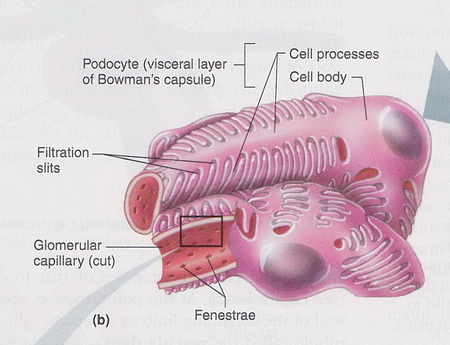How does glomerular filtration occur?
1 Answer
Blood pressure forces the fluid in the blood to be filtered across the capillaries of the glomerulus.
Explanation:
The Process of Filtration
The formation of urine begins with the process of filtration.

The Bowman's capsule is the filtration unit of the glomerulus.

Blood enters the glomerulus through the afferent arteriole and leaves through the efferent arteriole.
The pressure of the blood inside the glomerulus is increased because the afferent arteriole has a larger diameter than the efferent arteriole.
This increased pressure helps to force the following components out of the glomerular capillaries:
- Most of the water
- Almost all of the salts
- Almost all of the glucose
- Almost all of the urea
The water and salts pass into the Bowman's capsule as the glomerular filtrate.
Blood cells and plasma proteins are too large to pass through the pores.
How It Happens
The glomerular capillaries contain pores (fenestrae) and filtration slits that allow the solutes to pass through.

(From www.studyblue.com)
As the blood flows through the capillaries, the smaller solutes can pass through the fenestrae and the filtration slits,
Blood cells and proteins are too large to pass, so they continue on to the efferent arteriole.

